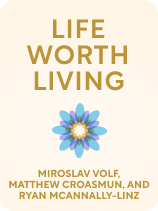

This article is an excerpt from the Shortform book guide to "Life Worth Living" by Miroslav Volf, Matthew Croasmun, and Ryan McAnnally-Linz. Shortform has the world's best summaries and analyses of books you should be reading.
Like this article? Sign up for a free trial here.
Do you have trouble getting started with new life habits? Do you lose momentum and fail to make the changes stick?
Life Worth Living discusses the importance of creating your own philosophy of life. When you glean a new piece of your life philosophy, it’s important to translate your newfound values into action. This might require making changes to your life or even to yourself, which can be an intimidating prospect.
Continue reading to learn how to make changes in your life, drawing on insights from economists, literary greats, and religious traditions.
How to Make Changes in Your Life
The authors’ advice on how to make changes in your life includes tips for getting started and sustaining those changes over time.
Getting Started
The authors explain that you may have some cognitive dissonance about making lifestyle changes based on your life philosophy: On one hand, you may know you need to change if you want to live well; on the other hand, you might be reluctant to change because your life is comfortable enough as is. If you feel this tension, the authors offer one possible resolution: the Christian concept of surrender. Volf, Croasmun, and McAnnally-Linz explain that Christians believe only Jesus can help you overcome reluctance to change. If you agree, you can start the process of change by admitting that you’re incapable of doing it alone, surrendering your soul to Jesus, and letting him guide you throughout life.
(Shortform note: The Christian theologian C. S. Lewis explains that surrendering your soul means choosing to do God’s will instead of your own and letting God rid you of the desire to sin. If the idea of surrendering your soul doesn’t resonate with you, life coach Tony Robbins offers a secular approach for overcoming your reluctance to change: He says that you can motivate yourself to act now by creating internal psychological leverage. This involves coming to terms with the pain you’re causing yourself by putting off the changes you need to make and reminding yourself of the pleasure that would follow if you made those changes.)
The authors also offer some strategies for those who are eager to make lifestyle changes. First, they recommend you use “nudges”—prompts that make it feel natural for you to practice a desirable habit—which economists Richard Thaler and Cass Sunstein describe in their book, Nudge. For example, you might keep a full water bottle next to you at all times if you want to drink more water.
(Shortform note: In Nudge, Thaler and Sunstein explain that nudges are useful because they help you overcome biased thinking. The authors describe several types of biases that can lead you to make poor decisions: For example, you might be susceptible to the status quo bias—the tendency to do what you’ve always done just because it’s your norm. This could lead you to make the same poor decision every day, like scrolling through social media first thing in the morning. To use nudges to overcome this bad habit, you might leave your phone in another room overnight and place a book by your bedside instead. This leaves you with a better default option in the morning—you’ll naturally reach for the book instead of your phone as you wake.)
However, Volf, Croasmun, and McAnnally-Linz explain that nudges aren’t appropriate for every kind of change; for instance, you can’t nudge yourself into pursuing a more meaningful career. (Shortform note: The authors of Nudge might take issue with the notion that you can’t use nudges to make big changes—in their book, Thaler and Sunstein apply nudge theory to everything from designing an affordable health care marketplace to resolving the tension between pro- and anti-gay marriage perspectives.)
Volf, Croasmun, and McAnnally-Linz cite two thinkers’ advice for making the kinds of changes that nudges can’t help you with. First, the Muslim philosopher Abu Hamid al-Ghazali advises self-scrutinizing: deciding how God wants you to behave, thinking before you act, and continually checking that you’re meeting God’s standards. (Shortform note: One way to practice the kind of self-scrutiny al-Ghazalirecommends is by keeping a habit tracker, which Ryder Carroll describes in The Bullet Journal Method. For example, if you believe God wants you to read scriptures every day, you might keep track of how often you do that in a month. Carroll says this increases your awareness of the progress you’re making toward your goals.)
In contrast, say the authors, Oscar Wilde recommends following your heart and scrutinizing society and its expectations of you—since you’re unique, you’re entitled to live uniquely, and it’s wrong of society to suppress your authentic identity. The authors say that, according to Wilde, you can discover your authentic identity and fulfill your unique potential via creative self-expression.
(Shortform note: If Wilde’s recommendation to scrutinize society and follow your heart speaks to you, you might try writing what artist Julia Cameron (The Artist’s Way) calls morning pages—three full pages of whatever’s on your mind as soon as you wake up. Cameron says this practice helps you clear your mind of things that don’t matter—like society’s expectations of you—and discover the things that do matter, like deeply hidden thoughts and feelings.)
Making It Sustainable
Volf, Croasmun, and McAnnally-Linz explain that, once you’ve started, you must sustain the lifestyle changes you’ve made in order to live well in the long term. They offer a few strategies from different philosophers for doing this. First, they recommend getting (or staying) involved in a community whose life philosophy is similar to yours. Such a community can continually remind you of what’s important and may have customs that help you put your life philosophy into practice regularly. The authors also note that according to Kimmerer (Braiding Sweetgrass), your community might not be limited to other humans—for example, if you value having a reciprocal relationship with the land, you might make a habit out of communing with nature.
(Shortform note: How can your community support you in living out your life philosophy? In The Art of Community, Charles Vogl explains that communities exist to join like-minded people together in honoring a common moral code. You’ll be more likely to uphold those morals if you’re surrounded by others who are equally devoted to them and if there are negative consequences, like community estrangement, for failing to uphold them. For example, if you care deeply about the environment, you might join an ecovillage that has rules about sustainable living. If, like Kimmerer, you want to include non-human lifeforms in your community, you might try an activity like forest bathing, which connects you with nature via your senses.)
Another strategy the authors recommend is meditation. They explain that, according to Buddhists, meditation gives you the opportunity to observe the true nature of existence: that everything is part of an endless, dynamic process. This knowledge enables you to gradually let go of your attachments (for example, you won’t begrudge death because you’re attached to life) and more easily see the connections between everything that exists. This process turns you into a more disciplined and empathetic person, which makes it easier to put your life philosophy into practice (assuming that you value discipline and empathy).
(Shortform note: The authors explain that meditation helps you sustain your choice to live out your life philosophy by improving your discipline and empathy—but how does meditation have this effect? Studies show that over time, meditation can result in physiological changes to your brain in the areas responsible for behavior regulation and empathic ability. But it’s worth noting that these studies refer to two different kinds of meditation—the type of meditation that boosts your discipline is based in mindfulness, while the type that boosts empathy is based in compassion. To get both results, you may need to practice both kinds of meditation.)
Finally, Volf, Croasmun, and McAnnally-Linz recommend prayer. They explain that Ignatius, who founded the Christian sect called Jesuits, came up with a daily prayer called the “examen.” Jesuits believe the examen helps you sustainably live out your values by making you more mindful of God’s constant influence in your life. To pray the examen, follow these steps: First, thank God for the parts of your day you appreciate. Next, reflect on the times you felt close to God today and the times you rejected him. Then, think about the day’s regrets and ask for forgiveness. Also, commit to repairing any harm you’ve done or that others have done to you. Finally, ask God to strengthen your relationship with him and help you get through tomorrow.
(Shortform note: You don’t have to be a Jesuit to make use of the examen—the prayer can be modified to suit your personal needs for reflection. Various elements of the examen may have value for both secular and religious people: For example, gratitude has been linked to positive thinking, reflection can help you align your actions with your beliefs, and understanding your regrets and committing to repair them can lead to self-forgiveness, which can enhance your mental health. If the examen doesn’t work for you, different prayers may provide other benefits, like a greater sense of peace.)

———End of Preview———
Like what you just read? Read the rest of the world's best book summary and analysis of Miroslav Volf, Matthew Croasmun, and Ryan McAnnally-Linz's "Life Worth Living" at Shortform.
Here's what you'll find in our full Life Worth Living summary:
- What a life philosophy is and why you should have one
- The four key components of a good life philosophy
- Why contemplating death can motivate you to live more fully






